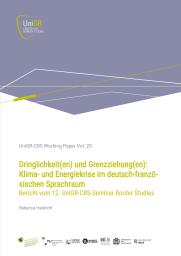Working Paper Vol. 25

This working paper provides a synthesis of the findings of the 12th UniGR-CBS Border Studies Seminar on the concept of “urgency” in the context of the climate and energy crisis. The seminar focused on research perspectives concerning the relationship between urgency and border delineations, as explored within an interdisciplinary working space from a Franco-German perspective. A key outcome of the seminar was the recognition of the spatio-temporal quality of multiple, ongoing Anthropocene crises in the context of energy system transformations. Talks from various disciplines, addressing different objects of study, all engaged with questions of representation and mobilisation, as well as the challenges of urgency. Finally, this working paper discusses an emerging heuristic of urgency in the context of boundary work. This heuristic not only highlights the relational interplay of spatiality and temporality within the energy and climate crisis but also foregrounds the affective configuration of urgency.
